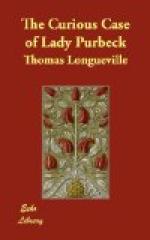“Yo:
Lo: in all service to commande
“(Signed)
GERRARD HERBERT.
“LONDON, this
“6 Oct.”
Lady Elizabeth would not submit to being let out of prison, just for the day, in order to witness the wedding, which was to a large extent a triumph for her husband. She meant, on the contrary, to have a triumph on her own account. Her intention was that one of those who had had a hand in putting her into prison—a prison which in fact was a comfortable house—should come to take her out of it; and she was determined to be escorted from her place of punishment, not as a repentant criminal, but as a conquering heroine.
In a letter to Carleton[36] Chamberlain says:—
“The King coming to towne yesterday it was told me that the Earle of Buck, meant to go himself and fetch ‘Lady Elizabeth’ as yt were in pomp Fr. William corner (where she hath ben so long committed), and bring her to the King, who upon a letter of her submission is graciously affected towards her. ... Seeing her yielding and as it were won to geve her allowance to the late marriage,” the King will “give her all the contentment and countenance he can in hope of the great portion she may bestow upon” Buckingham’s brother, Sir John Villiers; “for there is little or nothing more to be looked for from Sr. Ed. Cooke, who hath redemed the land he had allotted his daughter for 20,000L so that they have already had 30,000L of him paide down.... She layes all the fault of her late troubles upon the deceased secretarie,” Winwood, “who not long since telling her brother that for all her bitter speeches they two [Lady Elizabeth and her husband] shold become goode frends again. She protested she wold sooner be frends with the Devill.”
Lady Elizabeth was so much in the King’s good graces that aspirants for office tried to win her influence with James and Buckingham in their favour. Chamberlain, in the letter quoted above, expresses the wish that she might endeavour to obtain for Carleton the post of Secretary of State, which had just then fallen vacant through the death of Winwood. In a letter[37] written a fortnight later, however, Chamberlain says:—




